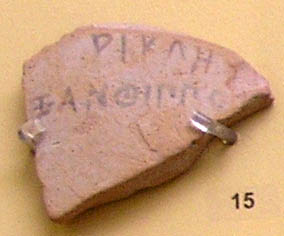If you’re reading this in the UK (and you don’t live under a rock) then chances are you’ll know that there’s a general election on its way. If you’re not reading this in the UK, then frankly I hope you’re getting better weather than we are at the minute, but apologies in advance—this is going to be about politics...
So. With the election now all but imminent, the lovely people at BBC Radio 4’s World At One programme asked @HaggardHawks to pop along and explain the origins of some choice political words—some, but not all, taken from our new factbook, Word Drops. These etymological snippets have been going out on Radio 4 every day this week, and while you can catch up with any that you missed on the BBC iPlayer (for the next few weeks, at least), we thought it might be worth explaining a few of the more intriguing word histories here on the blog.
We began on Monday with one of the main buzzwords of the 2015 electoral campaign—no, not Milibrand, but austerity.
On #wato today, we will have more from @HaggardHawks explaining the meaning of political words pic.twitter.com/Lm0APfcqQk
— The World at One (@BBCWorldatOne) April 28, 2015
With arguments raging over the plans opposing parties are each putting forward in their election budgets (a derivative of bougette, a French leather coinpurse, incidentally), it’s fitting to know that austerity traces all the way back to austeros, a Greek word meaning “harshness” or “bitterness”. Originally, it was used only in relation to poor-tasting or poor-quality food or wine, but over time this meaning broadened to come to include the figurative use of austere to mean “severe”, “frugal”, or “spartan”.
Speaking of political plans, manifesto unsurprisingly comes from the same root as manifest, in the sense of something becoming or being made clear or visible; the notion is, quite literally, that a politician or party makes all of their ideas clear in their manifesto. The initial mani– here derives from the Latin word for “hand”, manus (as in manipulate and manicure), and it’s thought that manifest might once have been used to describe thieves that were caught red-handed, with clear, incontrovertible proof of their guilt—hence the later sense of “clarity” or “visibility”. A connection between criminality and politics, you say? Surely not.
That brings us to quockerwodger. If ever a political word needed bringing back into common currency, then this is it. Though not a truly political term in its own right—it’s actually an old dialect word for a single-string wooden marionette, derived from quock, meaning “tremble” or “shake”—in nineteenth century slang, quockwodger was commandeered by the satirical press as a name for a “pseudo-politician”, namely one whose strings are being pulled by someone unseen.
And if you’re fed up with quockerwodgers, then it’s worth bearing in mind the original meaning of ostracism: back in Ancient Athens, voters could elect to have someone they disliked ejected from the city for anything up to ten years. Votes would be cast by writing down names on a shard of pottery called an ostrakon, and whoever’s name came up the most would be fairly unceremoniously run out of the city.
An ostrakon. That says “Pericles”, not “Farage”
The word SYCOPHANT literally means “fig-shower”. No one knows why.
— HaggardHawks Words (@HaggardHawks) April 10, 2015
Although, as we tweeted, no one is quite sure of the precise connection between sycophancy and figs, one possible theory holds that while Ancient Athenian politicians would sycophantically ingratiate themselves with one another, behind the scenes they would encourage their followers and supporters to heckle and jeer their opponents—which included showing them “the fig”. Effectively an Ancient Greek version of sticking two fingers up at someone, “giving the fig” involves pushing the thumb through the closed fingers of a clenched fist, so that the hand looks (with a little imagination) a bit like a fig. But is this the genuine origin of sycophant? It’s impossible to tell—but it’s a good story all the same.


cheap valentino uk, combining elegant style and cutting-edge technology, a variety of styles of cheap valentino messenger bags, the pointer walks between your exclusive taste style.
ReplyDelete